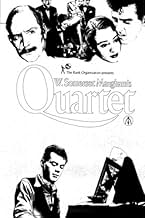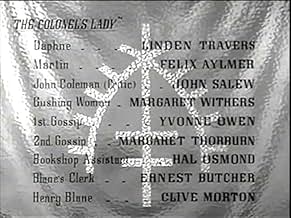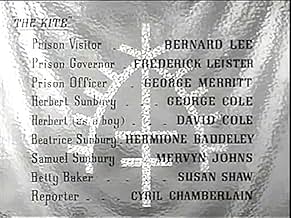Ajouter une intrigue dans votre langueFour of W. Somerset Maugham's short stories are brought to the screen with each introduced by the author. In "The Facts of Life", a young man with great potential on the tennis courts goes t... Tout lireFour of W. Somerset Maugham's short stories are brought to the screen with each introduced by the author. In "The Facts of Life", a young man with great potential on the tennis courts goes to Monte Carlo and ends up doing the exact opposite of what his father recommended. In "The... Tout lireFour of W. Somerset Maugham's short stories are brought to the screen with each introduced by the author. In "The Facts of Life", a young man with great potential on the tennis courts goes to Monte Carlo and ends up doing the exact opposite of what his father recommended. In "The Alien Corn", an aspiring pianist devotes himself to perfecting his artistic skills, but f... Tout lire
- Réalisation
- Scénario
- Casting principal
- Récompenses
- 2 victoires au total
Avis à la une
A set of four half-hour movies built on stories by Somerset Maugham, who also introduces the movie. They all have a witty naturalism that's totally likable, and the slice of life insights are sometimes even moving. You can only get so far into complexity in a short time, but these do well at packing their narrative efficiently. Really enjoyable. And, especially for those of us who aren't British, they are a total insight into British life (mostly upper class British life, for sure, and mostly post-war era).
It's hard to go into them all in detail but I'll point out the key thing to each that makes them watchable. I'm not talking plot, but some other quality. As follows.
The Facts of Life: The most fun might be the first, logically placed. A man is given advice by his father before going to Monte Carlo (that rich person's den of temptation). And things go exactly backwards, without the son really having a thing to do with it. You mostly smile and enjoy the ride.
The Alien Corn: More straightforward (except the title), and reveals a common Maugham theme of getting the practical British old folks to appreciate an artist's sensibility. In this case it's music. And it runs into a shocking final chord. Idealism up against the wall.
The Kite: Really a tale of a marriage that comes unhinged on one basic misunderstanding. Both main characters (man and wife) are stubborn about certain principles, and it comes to a rather simple kind of violence between them. And a resolution. Touching.
The Colonel's Lady: Certainly more touching, a funny and brilliant and sad bit of writing and stunning acting. This is probably the most involved of the group, and it's just tightly made, a short story in feel, and yet with enough layers to make it really lasting.
All of these are about real life and real people, and small things that end up mattering quite a lot. It's a different experience than a single feature movie, yes, but a refreshing one, with built in refreshment breaks. If you like this approach (sort movies in group), check out the Maugham inspired sequel of sorts called "Encore."
The second story, starring Dirk Bogarde, is also a bit unbelievable, and also a bit tragic. How tragic is it to not be good at the thing you love? After two stories about wealthy sons, Maugham writies "The Kite". in which he tries to aim for the Middle Class and the usual mother-in-law-wife tug of war. The story is a bit banal, but because of the author, we view it with greater meaning.
The best, however, is last. "The Colonel's Lady" is not about his mistress; it is about his wife. This short story is the type of writing that only Maugham and very few others are capable of creating. It is touching, incisive, and heartfelt. To be able to accomplish so much in such a short time is truly amazing. These stories, and particularly the last one, are not to be missed.
What it does do, brilliantly, is show us Maugham's keen observations on human nature. MAI ZETTERLING and IAN FLEMING star in a story about a young man who fails to follow his father's advice and almost suffers the consequences; DIRK BOGARDE and HONOR BLACKMAN are the leads in a story about a man whose sole passion in life is to become a professional top-flight pianist but is told by FRANCOISE ROSAY that he has no such chance; the third story is a rather dated and foolish morality tale about a kite that just didn't make much sense to me; and the final story--probably the best--is about a man whose wife secretly writes a novel about her great love (a la "Lady Chatterly's Lover") and is confronted by her husband who demands to know who "the man" in the story really is. CECIL PARKER and NORA SWINBURNE play the couple and they're wonderful.
Nicely performed, well scripted and directed, QUARTET has an introduction by Maugham himself which manages to be self-effacing and informative.
1948's 'Quartet' is the first of this particular trilogy, the other two being 1950's 'Trio' and 1951's 'Encore'. It is not an even film all the way through (anthology films seldom are, in a number of the numerous ones seen there is at least one segment that doesn't work as well as the others), but it is very good with not an awful lot to criticise as an overall whole. Of the three films, 'Quartet' is perhaps the best, though all three are worthwhile and more in their own right. Found a lot to like about all four segments, named "The Facts of Life", "The Alien Corn", "The Kite" and "The Colonel's Lady".
As said, there is not an awful lot wrong at all. For my tastes, "The Kite" ended slightly anti-climactically and "The Alien Corn", while still well done in its own way, beautifully acted, insightful and quite touching, has a different, darker tone than the rest of the lighter, more subtle stories and it slightly jarred in comparison.
There is an awful lot to like in 'Quartet'. Will agree with those saying that "The Colonel's Lady" is the best of the four, found it very insightful, beautifully subtle and very moving, the ending being an especially poignant touch. Loved the twists at the end of each segments, the most surprising being the one for "The Alien Corn", and the thoughtful hosting of W Somerset Maugham himself. 'Journey's End's' RC Sheriff adapts the stories with intelligence, refreshing lightness and respect for Maugham's writing, with a nice mix of emotion, thought-provoking subtlety ("The Facts of Life" being the most subtle and gentle perhaps), real insight into the subject matter, charm and offbeat amusement ("The Kite" particularly).
'Quartet' is beautifully filmed and directed, especially in "The Colonel's Lady", as well as evocatively scored throughout. The cast range from good to brilliant, with the best performance coming from Cecil Parker. It was interesting to see a pre-stardom Dirk Bogarde and he is also very good, as is Honor Blackman
Concluding, very well done. Worth seeing for especially "The Colonel's Lady", which gets my personal vote of the best segments of all three films in the trilogy. 8/10 Bethany Cox
This represents the first of the trilogy of films adapted from his insightful short stories.
'The Facts of Life' is interesting for the tantalising performance of Mai Zetterling whilst the least effective and pointless story is 'The Kite' featuring George Cole, an actor about whom I have never been entirely convinced who was lucky enough to find his niche on the small screen. In the tragic 'Alien Corn' directed by Harold French, aspiring pianist George is informed by virtuoso Lea Makart that he simply does not have that 'extra something' that makes a great artiste. Faced with this devastating judgement even the love of luscious Honor Blackman as Paula cannot offer him sufficient consolation. Excellent performances from Dirk Bogarde and the always magnificent Francoise Rosay.
Judging from previous reviews the jubilant surprise in the collection is 'The Colonel's Lady' directed by Ken Annakin. A perfectly judged and beautifully observed performance here by the immaculate Cecil Parker and a touching portrayal by Nora Swinburne as his wife whose 'scandalous' book of poetry causes all sorts of trouble. There is a very amusing scene where a literary critic played by Ernest Thesiger, likens her verse to that of Landor and Sappho which prompts Parker to storm off muttering 'Idiot!' The final reconciliation of husband and wife is beautifully understated. Excellent adaptations by R. C. Sheriff and a first class score by John Greenwood. It is undoubtedly this, the last of the set, which is the pearl in the crown.
Le saviez-vous
- AnecdotesThe symbol on the title page of each story is a W. Somerset Maugham superstition. Copied by his father on a trip to Africa, it is a Moorish symbol to bring good luck and ward off the evil eye. Maugham had it printed in his fourth novel, but unfortunately upside-down and the book flopped. Printed correctly on subsequent books, he became a best-selling author and had the motif reproduced everywhere, including his Riviera house, Villa La Mauresque.
- Citations
W. Somerset Maugham - Host: In my twenties, the critics said I was brutal. In my thirties, they said I was flippant; in my forties, they said I was cynical; in my fifties they said I was competent - and then, in my sixties, they said I was superficial.
- ConnexionsFeatured in Raiders of the Lost Archive: Épisode #1.3 (2009)
- Bandes originalesAlouette
(uncredited)
French Canadian Traditional
Sung by all in the Cabaret room in "Facts of Life" segment
Meilleurs choix
- How long is Quartet?Alimenté par Alexa
Détails
- Date de sortie
- Pays d’origine
- Langue
- Aussi connu sous le nom de
- Quartett
- Lieux de tournage
- Gainsborough Studios, Islington, Londres, Angleterre, Royaume-Uni(studio: made at Gainsborough Studios, London, England.)
- Société de production
- Voir plus de crédits d'entreprise sur IMDbPro
- Durée2 heures
- Couleur
- Rapport de forme
- 1.37 : 1
Contribuer à cette page



































